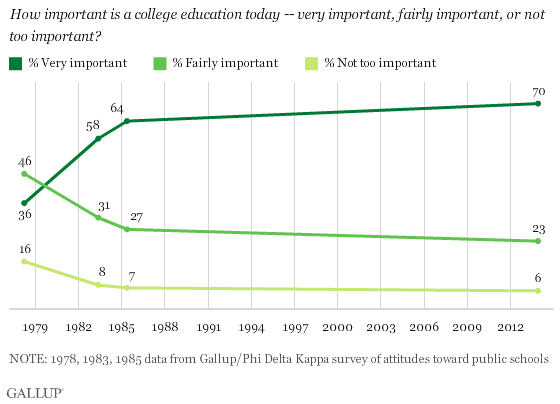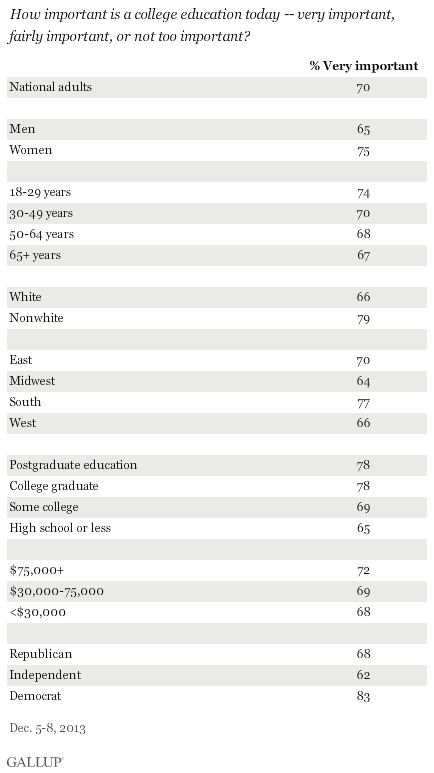PRINCETON, NJ -- Seven in 10 American adults believe that a college education is very important, up significantly since the 1970s and 1980s. In 1978, when Gallup first asked the question as part of a Phi Delta Kappa survey, just 36% of Americans considered a college education to be very important.

The importance Americans place on a college education is particularly relevant as questions arise concerning the relationship between the cost of a college education and its value. Additionally, various studies and anecdotes from recent college graduates lament the soft job market for Americans with a college degree.
At the same time, the high value that Americans place on a college education may reflect evidence that Americans with college degrees earn significantly more over their lifetimes than those without degrees. Or the perceived importance could be a nod to the effect of the new "knowledge economy" that often leaves young Americans without degrees unable to compete for jobs.
Clear majorities of all major subgroups of the U.S. population say a college education is very important, although this view varies by age, race, gender, education, and partisanship.
- Americans who have college degrees are significantly more likely than those who don't to say that a college education is "very" important.
- The perceived value of a college education is slightly higher among 18- to 29-year-old Americans (74%) than it is among those who are 65 years and older (67%).
- The value of a college education is significantly higher among nonwhites -- a group that includes blacks, Hispanics, and Asians -- than it is among whites.
- Women are more likely than men to value a college degree, which may reflect that higher percentages of women are now enrolled in higher education compared with years past.

Implications
Americans are certain - more so than in the past -- that a college education is very important in today's society. This is true even at a time when observers are focusing on the cost versus value equation of a college degree, and when new methods of learning such as online education may threaten the existence of many traditional colleges.
As the U.S. continues to compete in an increasingly globally competitive landscape, it's crucial that Americans gain the education needed to compete. Americans appear to recognize these realities. The fact that 70% of Americans agree that a college education is very valuable makes it appear that, in many ways, a college degree has become synonymous with the American Dream.
Yet, at the same time, Americans value earning a college degree so highly, they may also be more focused than ever before on what they expect from a degree. It's not just the degree that matters anymore, but what comes as a result: a good job and a better life. As the cost of higher education skyrockets, consumers will naturally demand more and have higher expectations -- presenting a host of new challenges for those who run colleges and universities in the years to come.
Survey Methods
Results for this Gallup poll are based on telephone interviews conducted Dec. 5-8, 2013, with a random sample of 1,031 adults, aged 18 and older, living in all 50 U.S. states and the District of Columbia.
For results based on the total sample of national adults, the margin of sampling error is ±4 percentage points at the 95% confidence level.
Interviews are conducted with respondents on landline telephones and cellular phones, with interviews conducted in Spanish for respondents who are primarily Spanish-speaking. Each sample of national adults includes a minimum quota of 50% cellphone respondents and 50% landline respondents, with additional minimum quotas by time zone within region. Landline and cellular telephone numbers are selected using random-digit-dial methods. Landline respondents are chosen at random within each household on the basis of which member had the most recent birthday.
Samples are weighted to correct for unequal selection probability, nonresponse, and double coverage of landline and cell users in the two sampling frames. They are also weighted to match the national demographics of gender, age, race, Hispanic ethnicity, education, region, population density, and phone status (cellphone only/landline only/both, cellphone mostly, and having an unlisted landline number). Demographic weighting targets are based on the March 2012 Current Population Survey figures for the aged 18 and older U.S. population. Phone status targets are based on the July-December 2011 National Health Interview Survey. Population density targets are based on the 2010 census. All reported margins of sampling error include the computed design effects for weighting.
In addition to sampling error, question wording and practical difficulties in conducting surveys can introduce error or bias into the findings of public opinion polls.
View methodology, full question results, and trend data.
For more details on Gallup's polling methodology, visit www.gallup.com.
